A Ticking Time Bomb in Sudan
Asharq Al-Awsat, London, June 21
Social media in Sudan has been abuzz with a photograph and a comment from a resident of one of Khartoum’s well-known neighborhoods. The person in the photo had moved to the area a while back, claiming to be a house guard or a real estate broker. He cultivated relationships within the community and became a muezzin in the local mosque. However, when conflict broke out in Khartoum, the people of the neighborhood were astonished to see the man dressed in the uniforms of the Rapid Support Forces, actively engaged in battle against the Sudanese army and taking part in the occupation of their neighborhood. It was later revealed that he was one of the Rapid Support intelligence’s embedded sleeper cells. Furthermore, it appears that the man came from Mali and had made his way to Sudan, as have millions of others who have reached the country in the form of refugees and unregistered arrivals. There is another tale circulating alongside a photo of a woman selling tea on the streets, a phenomenon that has seen a remarkable rise in recent years. This woman appears to have allied with the Rapid Support Forces, offering them information and intelligence. One individual wrote of a particularly unsettling encounter upon returning home, which his family had left due to the conflict. His mission was to retrieve documents and passports that had been left behind. Upon entering his abandoned family home, he encountered several Rapid Support recruits who had taken up residence there. To his surprise, he found the very same tea seller in the kitchen, preparing lunch for the troops. When they asked him who he was, he told them that he was the homeowner coming to take some papers for his children. After being allowed to take his items, he left the house in shock, feeling betrayed by the woman with whom he had conducted customary exchanges. Another person shared their story on social media of how they were forced to evacuate their home due to escalated battles in the region. Upon returning to their residence, they observed a group of armed non-Sudanese men hauling off their neighbor’s furniture, stealing every remaining item from the home. Stories like this tell a painful narrative of displacement, the forcible occupation of homes by Rapid Support Forces, and wrongdoing perpetrated by gangs of criminals and unauthorized immigrants. The prevalence of such occurrences can partially be attributed to the lack of effective residency and immigration systems and Sudanese hospitality towards strangers. As a result, there are now many immigrants and refugees residing in our neighborhoods and in surrounding areas. It has come to light that a number of these people are disregarding the law and engaging in thievery and vandalism. Worse still, certain individuals have been identified as helping Rapid Support Forces locate the homes of absentees and, in some cases, to target those that have retired from the armed forces and the police. The widespread looting that is occurring in the shadow of this conflict is not only caused by hunger and financial distress, although this clearly contributes to the situation. Sadly, the sheer scale of deliberate and organized damage inflicted upon the capital city after the fighting ceased is likely to set the country back for years, causing profound sorrow in the wake of damaged universities, banks, hospitals, museums, and so forth. The issue of illegal immigration and residence in Sudan is complex and sensitive. Prior to the outbreak of war, questions had already been raised regarding the influx of expatriates and refugees coming to Sudan legally, as well as the leadership of the Rapid Support Forces, which had imported large numbers of mercenaries from neighboring countries and granted them Sudanese citizenship. Now, the issue has grown more urgent considering reports about a plan to displace the capital’s inhabitants and settle new arrivals. This policy—which includes systematically relocating occupants such as RSF forces, gangs, and outsiders—is not new. It has been implemented in Darfur, where civilians have been terrorized, some have been killed, and others forced to leave to accommodate new settlers from outside Sudan. The issues surrounding foreign mercenaries will remain paramount when considering any potential integration of the Rapid Support Forces into the military. Questions surrounding these mercenaries’ loyalty to the government and people of a foreign country, and respect for the laws within it, remain. Thus, any agreement regarding integration faces considerable obstacles because of this war, and its ultimate solution hinges upon a successful conclusion of the war through both diplomatic and military means. The war has delivered drastic changes that leave many feeling instability and fear for their safety and that of their nation. Though there are no exact statistics, figures estimate that between 8 and 10 million refugees reside in the country unlawfully, creating a huge security concern. By registering and sorting refugees and deporting violators and illegal residents, Sudan would join the ranks of nations that prioritize the security and safety of their people. These measures are all the more necessary given the devastation of the war. —Osman Mirghani (translated by Asaf Zilberfarb)
This holiday season, give to:
Truth and understanding
The Media Line's intrepid correspondents are in Israel, Gaza, Lebanon, Syria and Pakistan providing first-person reporting.
They all said they cover it.
We see it.
We report with just one agenda: the truth.



